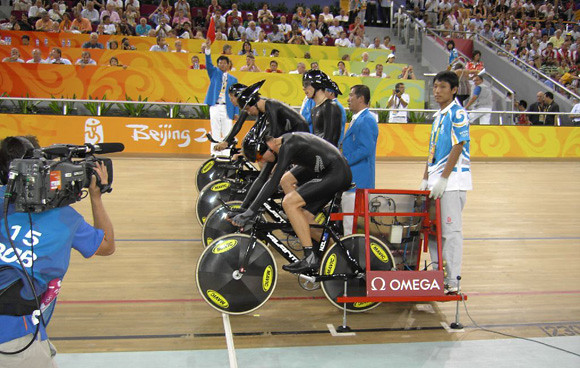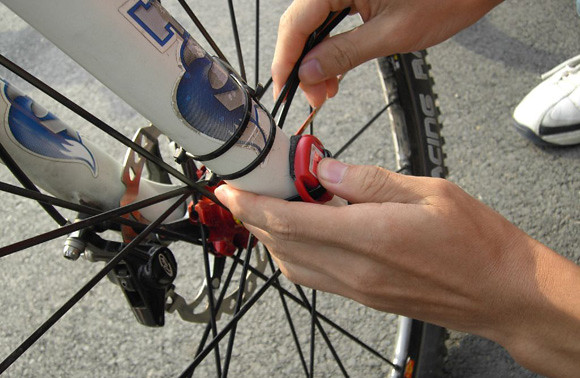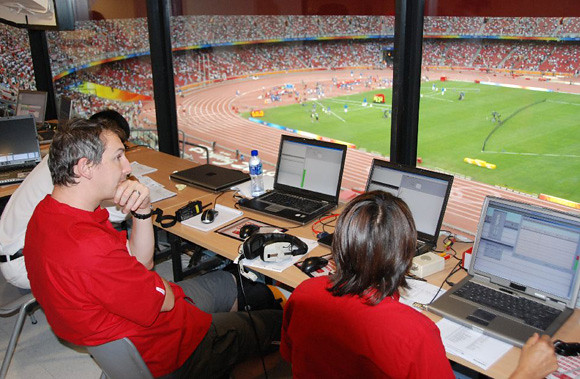
Image taken from London2012.com / The Olympic Park taking shape on 2010-04-01. An aerial view of the Olympic Park looking north-west, with the Aquatics Centre in the foreground. The Olympic Stadium with the completed lighting towers is in the background.
In fact the Games actually return to London, after they were held here in 1948. Behind the scenes there is a lot of other preparation work going on. Part of this is the heart of the Games, the time keeping. Implementing this complicated system of measuring, processing and reporting accurate times is a big thing and has a lot of ties to other elements of the event. At this stage this involves Architecture, e.g. buildings as well as infrastructure, later on technical settings as well as communications. This means that Olympic time keeping is always part of the preparations from very early on. Omega as part of the Swatch group is once more responsible for keeping accurate times across the whole of the Olympic Games in 2012. The company has a very long tradition in sports event time keeping and were the first company to be appointed for the job by the IOC at the Los Angeles Olympic Summer Games in 1932. They had also done the earlier London Games in 1948 and in this sense the coming event marks 80 years since their first job and will be their 25th instance to keep official Olympic times.
Hans Gubler, who is heading the implementation team of Swiss Timing, the company responsible for the running and installation of the time keeping system, speaks to single-blogs about the job of keeping accurate times and implementing the icon of timekeeping. Of course of interest will be the development of the technology since the implementation of the photo finish camera ' at the 1948 London Games, but also we want to discuss implications of time and working with time in a broader sense.
----
single-blogs: Is it important to be on time?
Hans Gubler: Yes and No. It depends largely in what context the "being on time" is. In my job being on time is very important.
single-blogs: Omega was the first time keeping company to take the official times at the Olympic Games in Los Angeles in 1932. They have done the job ever since. Can you explain briefly the historic key elements?
Hans Gubler: In the 1930s timing was still done manually, meaning using stop watches. An early version photo finish camera already existed but was not approved by the sports federation in those days. Horse racing was the first sport where a photo finish device was put in place. With the arrival of the transistor in the 1940s things changed rapidly. Our company started to develop timing devices of which the key element was a high precision quartz. Electric photocells were used to start and stop timing at great precision. At the same time the photo finish technology was further developed and eventually homologated for Athletics and used for the first time at the London 1948 Summer Olympics. In the meantime conventional photo finish film technology has been taken over by computer technology. New technologies also include the introduction of transponders.

Image by Hans Gubler / Olympic Summer Games Beijing 2008 - Swimming, Finished.
single-blogs: You are working for one of the biggest temporal events globally, can you describe your current workplace?
Hans Gubler: I work with a team of 12 people (employed by my company) working at the Games organising committee's premises. Our activities comprise of planning our needs in the Olympic venues (cabling, space and power requirements, infrastructure for sports scoreboards) and testing results system software with all dependencies (Television, Integration with other systems).
Swiss Timing is a Timing, Scoring and Results services company within Swatch Group alongside with Omega, Longines, Swatch, Rado, Tissot and other watch brands. Watch brands such as Omega, Longines and Tissot use Swiss Timing's services for marketing/branding at sports events. Events range from the Olympics and Paralympics to World Championships, World Cups and many more events.
single-blogs: The Olympic Games have a cycle of four years, what are the 'cycles' for your company, how much time do you need for the setup?
Hans Gubler: The setup takes about 3.5 years. Whereof we are 2.5 - 3 years on site prior to the Games. The operational teams would show up on the venues for the test events and finally, for the Games.
single-blogs: How many Olympic sites have you already worked on and where was it?
Hans Gubler: My first Olympic games were the Winter Games in Sarajevo 1984, then Los Angeles 1984, Seoul 1988, Atlanta 1996, Sydney 2000, Athens 2004, Torino 2006 and Beijing 2008. In Sydney I started to be on site long term (three years), whereas before my involvement was only just for the Games periods.
single-blogs: Looking back, how have you come to this position and what is your background?
Hans Gubler: I come from an electrical engineering background and have worked in this industry for the last twenty years. At the time I looked for a job in a technical environment connected to sports.
single-blogs: What are the differences between personal and work related time aspects?
Hans Gubler: Personal time management can often be adjusted according to how one feels. Not all time lines have to meet a certain deadline. Professionally there are two levels. The first is to meet the time lines of deliveries (submission of documents, building/installing of equipment, testing of software) to synchronise with other parties' deliveries. The second is to be on time for a sports match or race and be precise in timing sports events (i.e. 100m dash race).

Image by Hans Gubler / Olympic Summer Games Beijing 2008 - Cycling Track, Start system.
single-blogs: In a rather global sense, how would you define time?
Hans Gubler: Time can be either described as space (amount of time) into which a quantity of work/activity is placed or the moment things are happening (from now to the end of race).
single-blogs: Are you using a specific definition of time you are using for your work?
Hans Gubler: Both of the above definitions. 1. Planning phase and 2. The actual event, measuring time of a sports performance.
single-blogs: How accurate can time measuring be?
Hans Gubler: Time accuracy can be indefinite however technical constraints and sports rules and regulations keep accuracy at bay. The highest resolution required in sports for the time being is 1/1000th of a second (i.e. Swimming), whereas Marathon over 42km only requires a resolution of 1 second.
single-blogs: Speaking of these completely different sports that the Olympics cover, how do they differ in terms of time keeping? Witch one is technically the most complicated to measure, witch one is the most beautiful?
Hans Gubler: Typically there are two categories namely timed sports and scored sports. Every sport has its own rules however some sports are very similar. Handball, Basketball, Football, Water polo for instance are scored sports where the match time is timed but the scores are relevant for the outcome. Swimming, Cycling and Athletics require precision timing for the ranking of the athletes. One of the most complicated sports is Modern Pentathlon where five disciplines are played in one day (Fencing, Swimming, Riding, Shooting and Running). It requires a lot of timing and scoring equipment and is intricate when it comes to networking all five sports for results compilation and live TV coverage.
Every sport has its beauty one way or another. My personal favourites to watch are Athletics and Tennis.
single-blogs: Do different conditions for time measuring exists. Say like weather conditions influence the performance? Does the wind direction influence the time?
Hans Gubler: Weather as such does not really influence time keeping (as long as the equipment is kept dry to function), however wind is a factor taken into account in Athletics where the sports rules stipulate a record time only to be recognised with wind from the back of < 2m/second. This rule applies to track races of up to 200m and long/triple jump. single-blogs: What are the different methods you are using to work with time?
Hans Gubler: Time is measured by using visual means (photo finish camera technology), infrared beams, wireless transponders, GPS technology

Image by Hans Gubler / Olympic Summer Games Beijing 2008 - Mountain Bike, Transponder.
single-blogs: Photo finishing and infrared are stationary technologies, GPS and wireless transponders can be mobile, are you tracking all the athletes and how accurate can this be?
Hans Gubler: GPS and wireless tanponders are mainly used for pisitionning of athletes during the race (intermediate times). The accuracy is no more than 1/10 of a second and is not recognised as the offical finish time.
single-blogs: Back in the Days of the 1932 Los Angeles Games hand-operated chronographs were used for timekeeping. What does it mean to work with time today, can you describe the context and support systems required?
Hans Gubler: The heart of time measurement is the high precision quartz used in custom made timing computers. Leading from there (depending on what sport and what precision is required), infrared beams, high resolution photo finish cameras, transponder systems or GPS systems are put in place.
single-blogs: Are you using the latest technology or even inventing them especially for the games or is the reliability of the system more important and you only implement well tested and proofed systems? What is the innovation you bring to the London 2012 Games?
Hans Gubler: New technology is developed not just for the Olympic Games but also for other high profile events such as World Championships and World Cups. Whether it would be for the Olympics or other events, new technology is tested thoroughly over periods of time in shadow (running alongside with existing and approved systems) before they are approved and used for events. Wireless systems are, in fact, not used in mission critical areas (i.e. data entries at Tennis, false start systems at Athletics etc.) since the risk of being interfered by other RF users is very high, especially in the Olympic Games.
New technology in London, as an example, is the timing of the mark roundings at Sailing using GPS.
single-blogs: Is there a backup system if the timing fails?
Hans Gubler: All crucial systems are equipped with back-up systems. The back-up system consists of a secondary system doing exactly the same as the primary system. A further contingency is the power supply back-up in form of an UPS (un-interrupted power supply).
single-blogs: Has there ever been an incident of hectic moments with failing systems at any of the Olympics you have worked for?
Hans Gubler: In Seoul 1988 the cartridge of the starting gun failed to go off properly in an Athletics race. The timing system was then immediately switched to the back up system. The race finished without a flaw.
Note - This is not the race mentioned above, just one of the races from Seoul in which Ben Johnson pitched a new world record over 100m.
single-blogs: The event relays on the time-measuring to determine the winners and this is turn is connected to a lot of investment and money in various areas. This presumably put a lot of pressure on the system and your job. Can you sleep at night?
Hans Gubler: The pressure is very high before and during the Games for both the operational and managing staff. The key element to meet and reduce risks is anticipation and proper preparation (thorough testing of software, hardware and procedures (exercising the switching to contingency systems)).
single-blogs: You are also responsible for the result tables and ranking system, how much time lies in between the event, the end of the event, and displaying it to the spectators on site and on TV? Is this immediate and solely determined by the technology or do you have to consult photos first and a judge takes a decision?
Hans Gubler: In the case of Athletics and Cycling the winner's time is displayed immediately (sub-second) on scoreboards and TV. The official time for the winner and all other athletes is read from the photo finish pictures and transferred into the results system as they are read. This process is a matter of a few seconds, unless there is a tie where careful analysis of the picture is required. In Swimming the times are officially recorded by the touch pads at the end of the pool.
single-blogs: Do you think different times exists, take place or could be constructed?
Hans Gubler: I think time could take place at a different level perhaps combined with space. There could also be different time levels that are still unknown to us.

Image by Hans Gubler / Olympic Summer Games Beijing 2008 - Athletics, Timing Room.
single-blogs: Would you say that there is something like a time legacy? In some sense one could argue that the times measured for the Olympics live on in the record books for generations of athletes to try and compete. What is the importance of the times in the context of the Olympics but also in general?
Hans Gubler: The legacy of times/records can be regarded as milestones for other athletes to live up to. They serve as comparison data to the media (press and TV/radio commentators). Times and records from the past also reflect the development of sports and increase in performance. A famous, if not the most famous, record was probably Bob Beamon's 8.90m in long jump during the Mexico 1968 Olympics. The record was only broken by Mike Powell with the distance of 8.95m in 1991.
single-blogs: You have lived in a lot of different countries, following the Olympic circus. Can you describe differences in time perception, usage or keeping from your experience?
Hans Gubler: There is definitely a difference of time perception depending on peoples' culture and mentality. A big difference I experienced between the Mediterranean (Athens) way of thinking (rather casual approach to managing time) versus the Chinese (Beijing) way of time approach (nothing is left unplanned, no surprises). The difficulty for us came with the former approach leaving little space for errors (planning, testing). Interestingly the former approach also meant more flexibility whereas the latter was much more rigid.
----
In an interview series single-blogs is looking closely at meaning and implications of time in everyday life situations. In the form of dialogs different aspects are explored, with the idea to highlight characteristics. The main interest is circling around the construction and implementation of different concepts of time between independent but related areas of activity, such as leisure and work, private and public, reality and virtual. This interview series will not be continuous, but more adhoc, so you might want to use the interview tag to catch up with the rest.

Image by Hans Gubler / Olympic Summer Games Beijing 2008 - Athletics, Finish camera.
Tidak ada komentar:
Posting Komentar